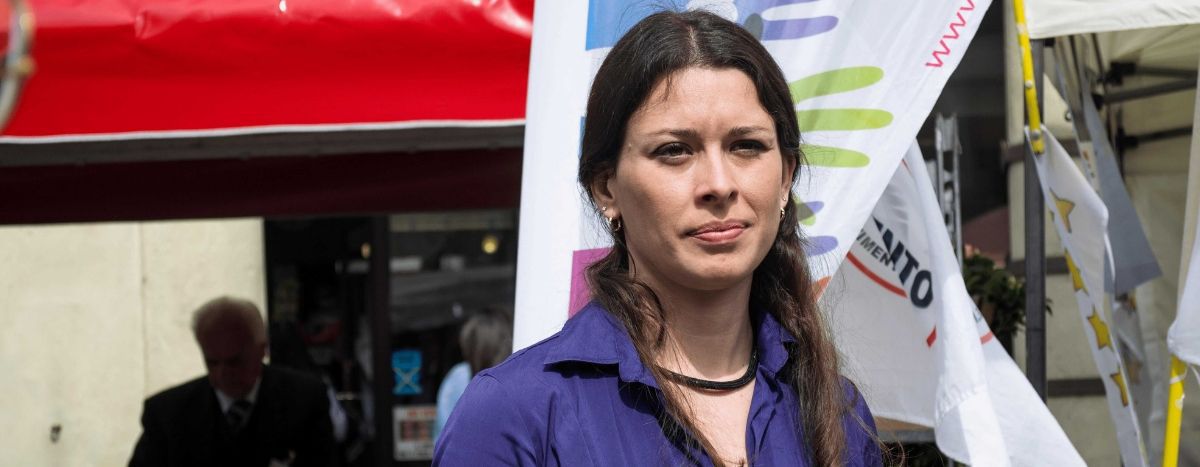
Sabrina Pignedoli: On the road to the European elections
Published on
Translation by:
 Victoria S
Victoria S
Sabrina Pignedoli, an investigative journalist who denounces corruption and organised crime, has been appointed consultant for the Parliamentary Anti-Mafia Commission. Deeply dissatisfied by the traditional political system, she is now the leader of the Five Star Movement (Movimento 5 Stelle) and the Northeastern candidate for the European elections. Accompanying her on a few of the key stops during her electoral campaign, Cafébabel has been given the opportunity to get to know who the real Sabrina is behind the scenes. We'll follow her around her North-Eastern constituency, where — like as is the case in the rest of Italy — the European elections attract very little attention.
The last few months have been full of surprises for the Emilian Sabrina Pignedoli. At just 35 years old, the Vice-President of the Council, Luigi Di Maio, selected her as the leader of the Northeast constituency in the forthcoming European elections. This did not come completely out of the blue, as the position was proposed to her after being appointed as a consultant for the Parliamentary Anti-Mafia Commission Movement last March. Since then, Sabrina has become increasingly involved in the Five Star Movement. Its members eventually approved her candidacy via the web platform, Rousseau. An online block vote was held to approve the Movement's five female leaders. Each candidate was backed by Di Maio himself for the European elections, but there was a lot of controversy and discontent surrounding the choice to opt for a Five Star Movement "outsider".
On the road
Reggio Emilia Station. The morning air is crisp and the first warm rays of sunshine welcome a spring day. Sabrina is picking me up in the car. I hop in the back and we are on the road - and already running late. We are heading to Faenza for a press conference and an inevitable trip to the market, to meet the locals. No need for introductions. We had already met the night before, at the electoral campaign meeting, called Continuare per Cambiare, anche in Europa (Continue to Change, even in Europe). What we need now is a coffee, but we don't even have time for a cigarette. Her assistant Marco, always at Sabrina's side, seems to be the one who suffers most on electoral campaigning days.
"Do you see this building?" Sabrina asks us before heading towards the ring road. "It's the Palace of Justice in Reggio Emilia. I've spent a lot of my time there. I was a plaintiff in the Maxi-Trial of October 2015 [a criminal trial against the Sicilian Mafia]. I had been pressured and threatened by them not to publish certain information when I was a journalist for the Resto del Carlino."
As we're driving down the ring road, we pass a grey building from the 1920s. Sabrina points it out: "Trials for a lot of brigatists have taken place within this courthouse." In fact, the heart of the Red Brigades was born, right here, in the province of Reggio Emilia, in the early 1970s. And yet, the austere building in front of us is in fact most famous for its recent events: the Maxi-Trial in October 2015 and the legal proceedings that finally revealed the roots of the 'Ndrangheta, the mafia-type organisation from Calabria.
"I was a witness as a journalist. The system of infiltration and control of the 'Ndrangheta territory became clear to me. The 'Ndrangheta managed various economic activities." One example being markets for the reconstruction of areas that suffered in the 2012 earthquake, which tore apart Emilia-Romagna (particularly Reggio Emilia and Parma). "I was threatened. And I suddenly found myself alone._" says Sabrina, her voice firm and her attitude composed. "Only the Movement stood by me and supported me. All the other politicians, from both the left and the right, turned their backs on me. I then fought for the trial to take place right here, in Reggio, as close as possible to the citizens who were affected by it all."
Only the Movement stood by me and supported me.
After obtaining her degree in DAMS (in Cinema and Performing Arts) from the University of Bologna, in 2007 she worked in Rome as a costume designer for Massimo Ranieri's Traviata. She recalls the deep admiration and curiosity she felt watching the journalists who would flock to the front of the theatre. Always fascinated by the profession, she eventually enrolled in Bologna's school of journalism, with her main interest lying with crime and judicial news. She then followed the classic path of an aspiring journalist in Italy: internship after internship, countless project contracts, permanent contracts that never seemed to come about, until she was finally hired at the Resto del Carlino in Reggio Emilia. There, she went on to publish in Espresso, on the presence of the 'Ndrangheta in Germany (the research was supported in part by EU funds).
Bringing the anti-mafia campaign to Europe
On the A1 motorway, Sabrina Pignedoli keeps a concentrated gaze behind the wheel, while trying to mentally reorganise the agenda for the next few days. The candidate has difficulty remembering the long list of appointments that await her. Marco pulls out his smartphone. "Where are we tomorrow?... And the day after?... Okay. At least there's a day off. We'll have to go through Padova, Trieste...Those are compulsory stops!"
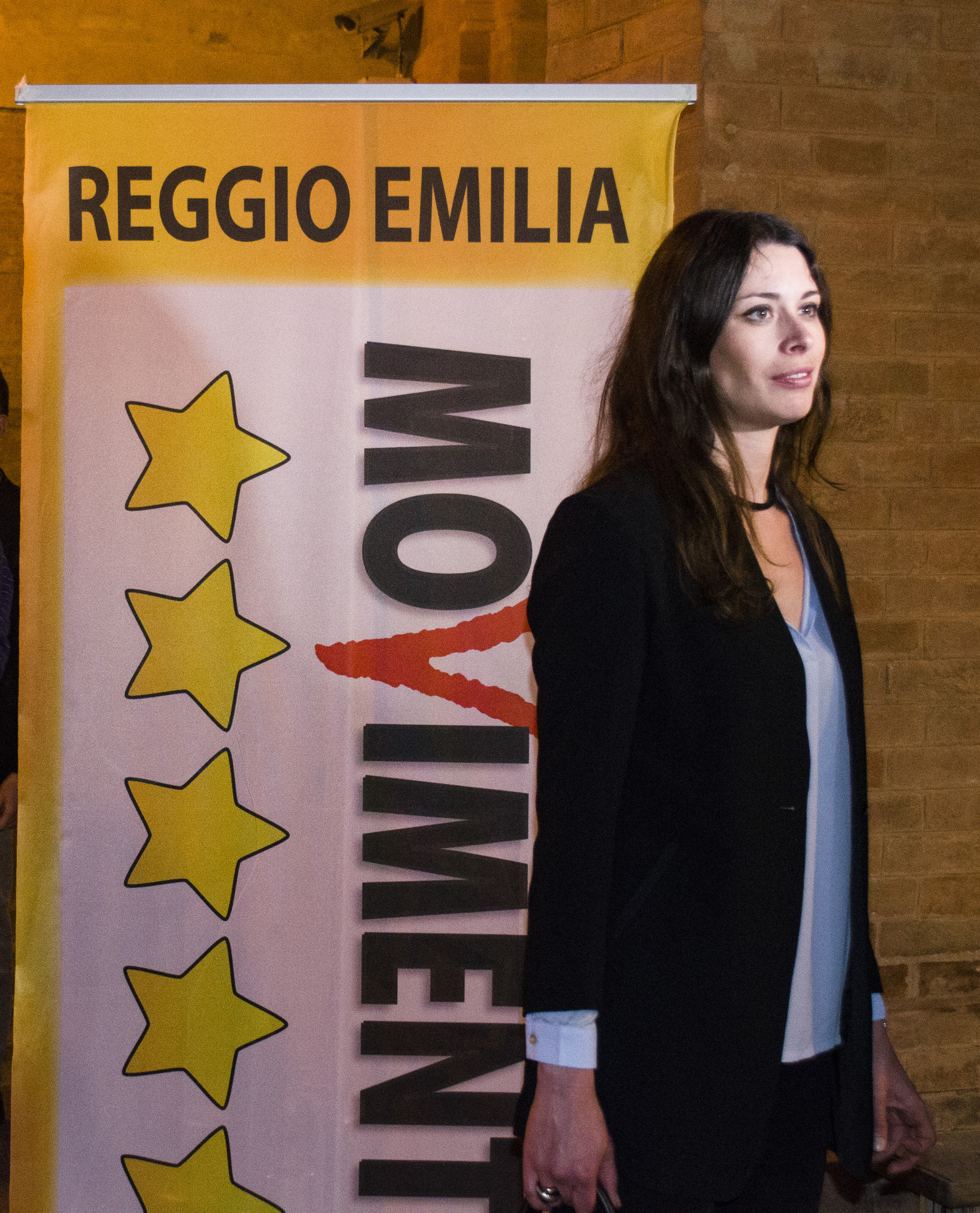
Many Italians would refer to Sabrina Pignedoli as giustizialista (a term created by the Italian media to define a person who supports severe justice). To her, this utmost confidence in the law is more important than anything. When she arrives at the main square in Reggio Emilia, Sabrina Pignedoli turns to address her potential voters. The focus is always on the fight against organised crime. She sees it as a fight a European level. This is reflected in her electoral programme, which proposes to extend Article 416a of the Italian Criminal Code, which fixes mafia-style criminal associations, to the legislation of other Member States.
"The widespread opinion in other European countries is that the mafia is only a problem in Italy — similar to when Northern Italy believed it was only a problem in the South. This is why I want to make the issue of organised crime a focus of the European agenda, as we're talking about transnational organised crime here. You can only fight it by working on a European level." Her tone changes when she explains to me how the preventive seizure of real estate, as well as its confiscation and social re-use, is a fundamental conquest of Italian legislation. The expansion to a European level is essential.
In addition, there are problems with Eurojust and Europol; the first, the EU body whose task is to promote the coordination of investigations and prosecutions between member states; and the second, the EU agency with the aim of fighting crime on a European level. "How do we think we can fight organised crime if the staff of these bodies are unaware of the phenomenon and there is no systemic approach to organised mafia-type crime?"
We're talking about transnational organised crime here. You can only fight it by working on a European level.
Sabrina Pignedoli can hardly wait to make her voice heard, as she defines it "League A Europe and League B Europe". And the European media? "They call us populists, sovereignists, Eurosceptics... and incompetent, too. I tell you, we are the only ones who have acted tangibly, who have successfully reduced pensions and who have created change in the field of Italian legality. Like with the case of Siri." (The revocation of Lega Nord's Undersecretary for Transport and Matteo Salvini's economic adviser, who was investigated for corruption).
In addition to her personal fight against the mafia and for justice, Pignedoli stresses in the field of social policy the importance of a European minimum wage. It is one of the key points of the Five Star Movement programme, but also of the Democratic Party, so that change continues in Europe as well. "The minimum wage is already on the current government contract with Lega Nord." The remark of the government's agreement between the Five Star Movement and the Lega Nord makes Sabrina nervous. She immediately reiterates that this is not a political alliance, but a mere contract, drawn up on a list of specific points. For Sabrina, the stance of Five Star Movement and Lega Nord remain very distinct.
According to the latest poll conducted by the Demos institute, two out of three Italians still do not know who to vote for in the European elections on the 26th of May. The Five Star Movement faces losing up to 10% of its votes in comparison to the 2018 elections, however, they do seem to be gaining ground on their opponents, able to count on 23% of the voters. Even if this is a "contract" and not an "alliance", it seems that citizens may be reluctant to vote for the Five Star Movement, out of fear that they are too closely linked with the far-right party.
Also read: Citizens' Income: A show of solidarity for Italy’s government of change
On-stage lessons
"We need to get people back to the polls." Although motivated by the desire to bring people closer to Europe, Sabrina Pignedoli doesn't thrive on stage. This is also why she struggles to bring the crowds together. In the main square in Reggio Emilia, when her turn finally comes, her voice seems broken. She gives a concise speech, even when she talks about organised crime. "I'm not satisfied with my speech tonight. I was really uncomfortable. It was strange to be on the other side," she says. "Reggio is my city. I've always been known as a journalist for the _Resto del Carlino [one of the oldest newspapers in Italy] here. Now I have a new political role. I'm not used to it."
The truth is, Sabrina Pignedoli has never been in politics. "The day the Di Maio staff called me and proposed me as a candidate, I was over the moon. I believe that Di Maio chose me for my professional career, in line with the values of the Movement." After less than a month of campaigning, is it time to take stock? "Life doesn't change, but exhaustion is building up. Sleep is scarce with a full electoral agenda. I don't dare imagine the tour de force in the final week before the 26th of May!" She then runs off to greet her parents, who are in the audience.
Now I have a new political role.
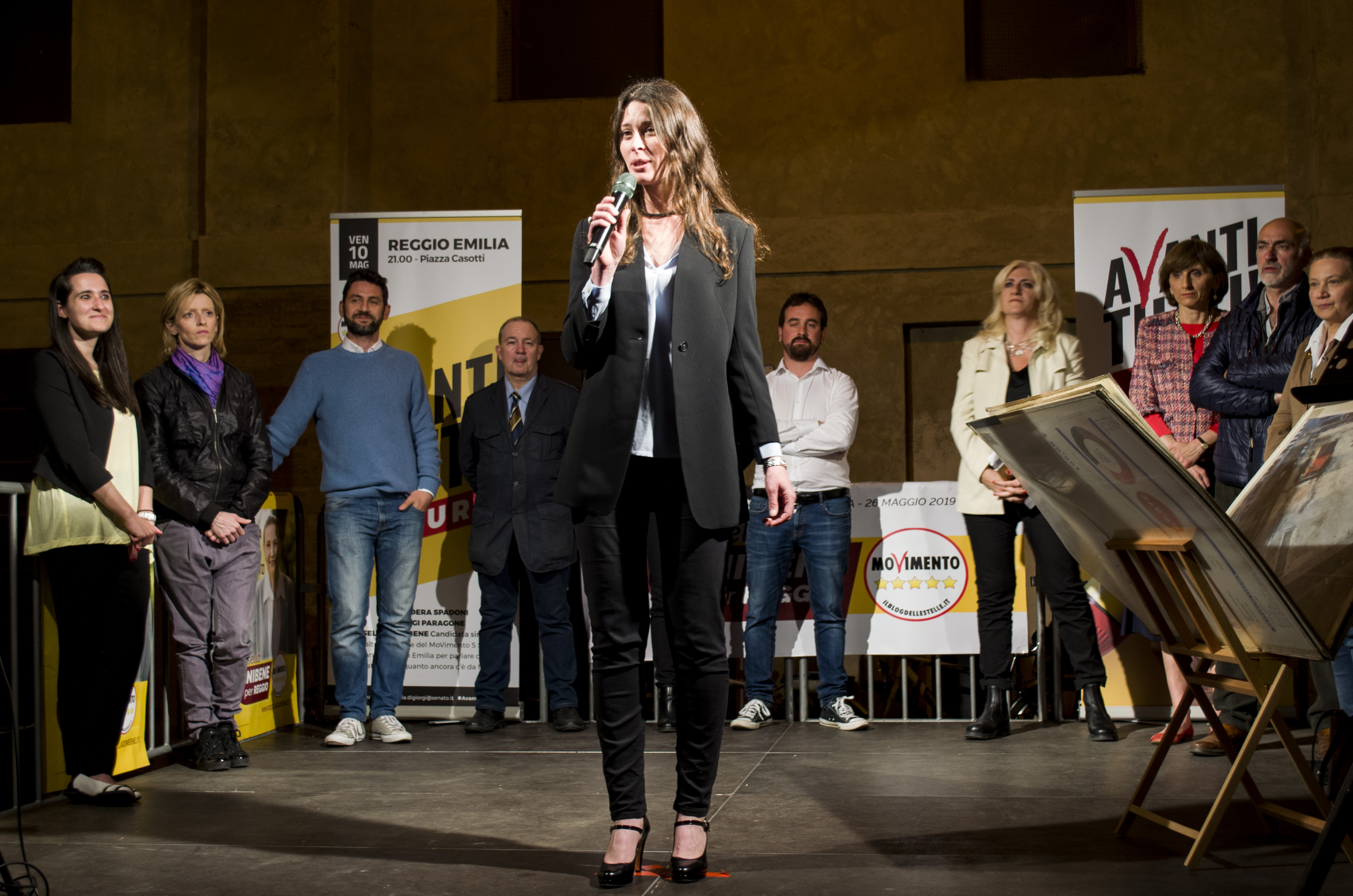
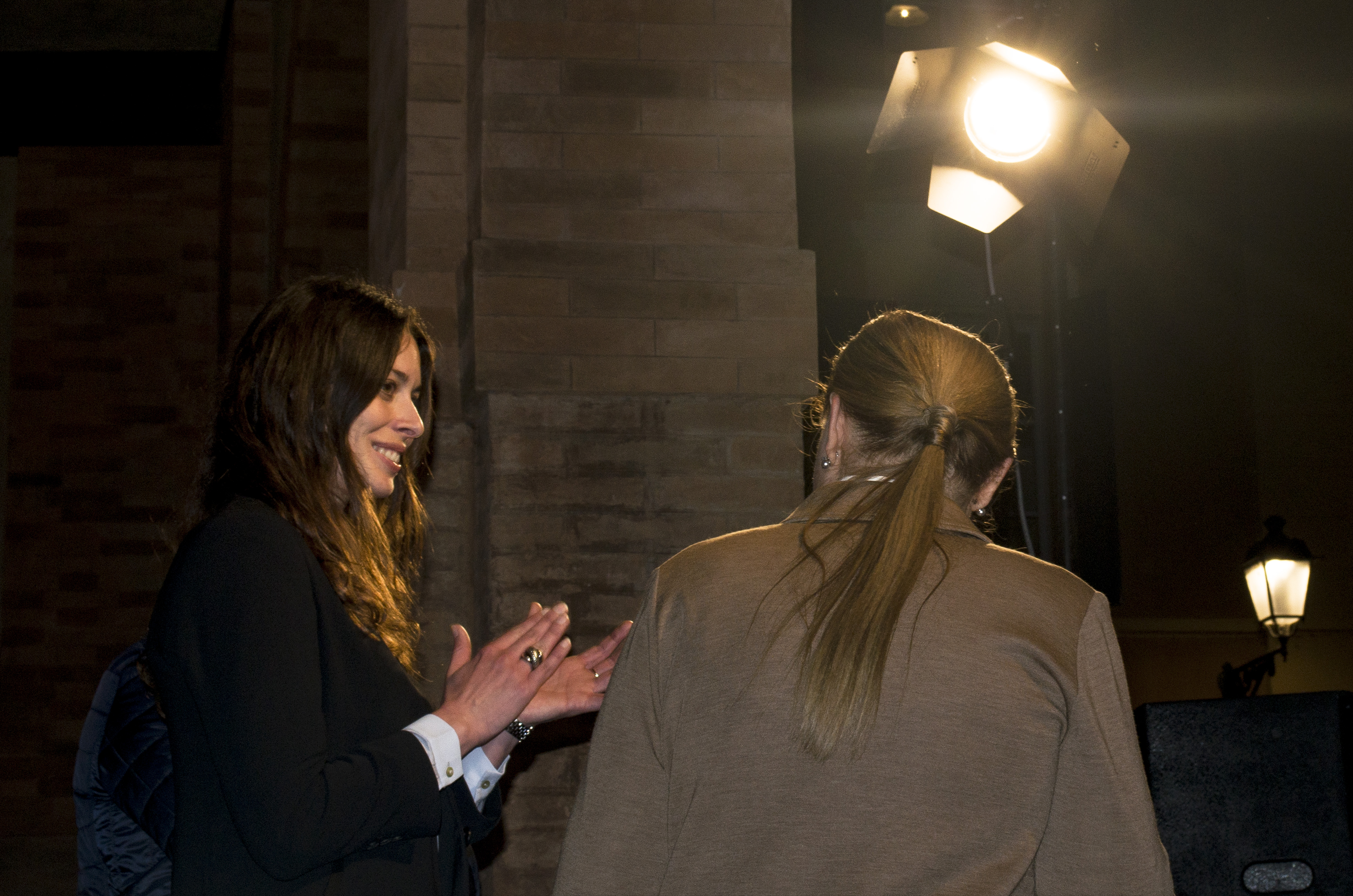
Although aware that she is out of her depth, the Five Star Movement candidate tries to proudly defend her role. She knows it will take time to adjust to her new life. She is also one of the youngest Italian top candidates in the European elections. Unlike the other candidates of the Movement who speak vaguely about the environment and social welfare, her strength, according to her supporters, is her use of precise and factual information. Her best quality? Self-criticism. The day after the party in Reggio Emilia, at the stall for Five Star Movement activists in Faenza's main square, Sabrina returned to reflect on her performance she said: "You can really tell it's the first time, can't you?" It would certainly be easier if she were on a dance floor, dancing is one of her biggest passions. Back in the day, the elderly men in the main square of her little village in the Apennines (50 km from Reggio), would invite her to dance. But, she hasn't danced for a long time now. Or maybe they just don't dare to ask her anymore, now that she has a new role in politics.
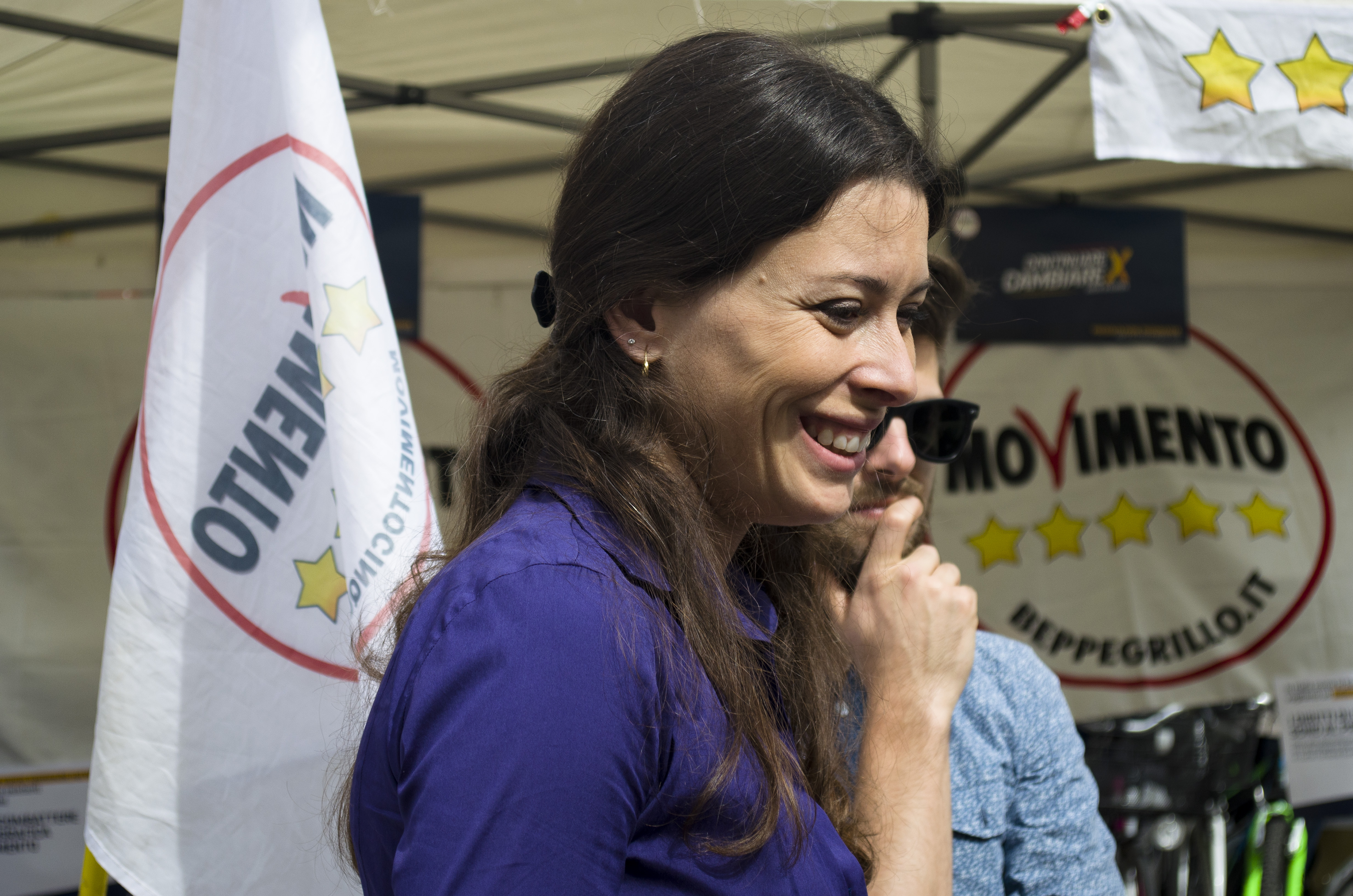
On market day, the competition makes its presence felt. In addition to the Five Star Movement, the Democratic Party and the Lega Nord have decided to take to the streets ahead of the elections. Amidst the passers-by, some curious people approach the Five Star Movement stall. They are able to have a friendly, relaxed discussion about the electoral programme with Sabrina who listens attentively to their needs and criticisms. With a smile, Sabrina interacts with the visitors and ensures that she responds as fully as possible. She then pulls out the "generational" card again. She too is fed up with all the brain drain: "In the European Parliament, the Movement will only sit at the table with those who share the same values as us and will put the younger generations at the centre of political proposals." But with whom will the Five Star Movement be allied? "It is still too early to make a firm decision," she says, dodging the question.
We need representatives who believe in parliamentary debate, who reignite the passion for politics among the population, who really go back to being politicians — in Europe as well. 35-year-old Sabrina Pignedoli seems to be running around Europe with the desire to "do her duty". Will this be enough to put citizens at the centre of future decisions? Surely, as a "giustizialista", she will have what it takes.
__
Photography credits: © Francesca Festa
Read also: Who's defending freelancers in Italy and Europe?
Translated from Sabrina Pignedoli : sulla strada per le Europee


